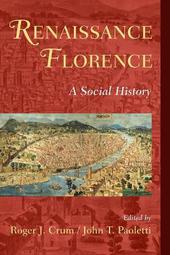
|
Renaissance Florence: A Social History
Paperback / softback
Main Details
| Title |
Renaissance Florence: A Social History
|
| Authors and Contributors |
Edited by Roger J. Crum
|
|
Edited by John T. Paoletti
|
| Physical Properties |
| Format:Paperback / softback | | Pages:692 | | Dimensions(mm): Height 228,Width 153 |
|
| ISBN/Barcode |
9780521727877
|
| Classifications | Dewey:945.5105 |
|---|
| Audience | | Tertiary Education (US: College) | | Professional & Vocational | |
|---|
| Illustrations |
70 Halftones, unspecified
|
|
Publishing Details |
| Publisher |
Cambridge University Press
|
| Imprint |
Cambridge University Press
|
| Publication Date |
31 March 2008 |
| Publication Country |
United Kingdom
|
Description
This book examines the social history of Florence during the critical period of its growth and development in the early modern period, from the fourteenth through to sixteenth centuries. Treating the city, its art, and its rituals, the contributors to this volume consider well-known objects, monuments, sites, and events in the vivifying context of a variety of spaces, which are here understood as a dimension of physical, psychological, religious, and political perceptions for the city of Florence during the Renaissance. The volume provides a multi-dimensional view of Florence as it evolved into an economic powerhouse and dynamic center of artistic achievement, as well as the setting for political and religious struggles. It also demonstrates how permeable boundaries between the disciplines of history and art history have become.
Author Biography
Roger J. Crum is Professor of Art History at the University of Dayton, where he has held the Graul Chair in Arts and Languages. John T. Paoletti is William B. Kenan Professor of the Humanities and Professor of Art History at Wesleyan University.
Reviews'The result is a fresh vision of Florence's history that will be useful for teaching but that also contains new research. the volume is attractively presented with numerous black and white illustrations and also includes extensive notes, select bibliography and a name and subject index.' History 'I hope this rich collection will encourage others to engage in a process of social unveiling.' Sixteenth Century Journal
|